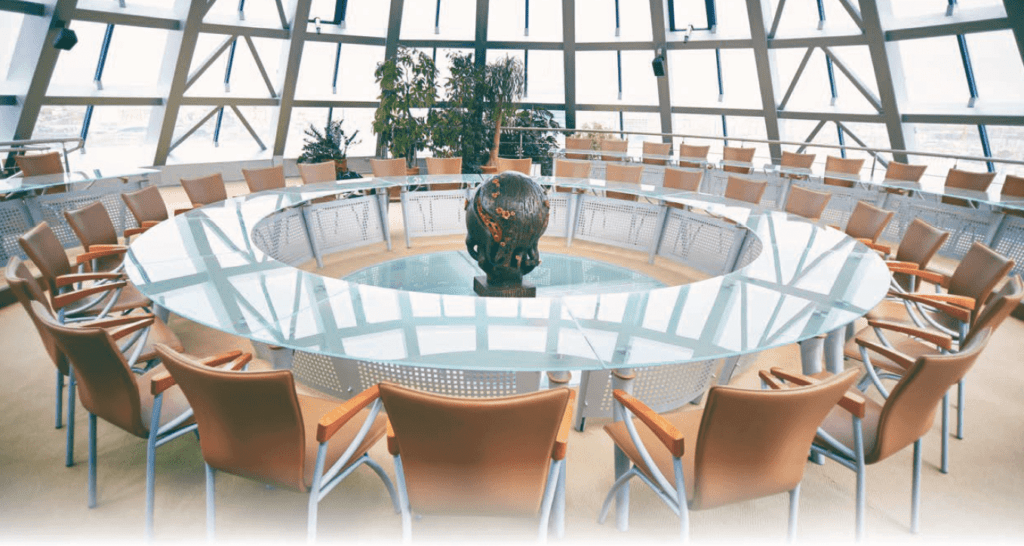
‘We cannot know’, the experts say! We can have expectations about the solutions that different developments will lead to, but the outcome, due to the dynamics in combining these new evolutions, we cannot foresee as yet. Just as in former days when technological revolutions completely changed the circumstances of societal behaviours and thus prepared the ground for political turbulences, is the wind of change blowing again?
There is destruction and const-ruction at the same time, and it seems that a political system that is best at coping with the costs of change while setting the best framework conditions to make new developments flourish will be best at keeping its society together. It is the question of having the design of a new concept at the centre of this observation, a concept which must be regional and global at the same time, a concept that focuses not only on ‘the economy’ but also the society. Future competition will be about the right setup in transnational policymaking and not about competitiveness in global trade alone.
As a global organisation, the WTO could not match these requirements due to its focus on regulating the terms of trade. Trade liberalisation has increased the volume of goods traded by 41 times the level of the early GATT system in the 1950s. Today, world financial transactions far exceed the volume of traded goods, doubling between 2002 and 2008 only 95% of this is speculation.
Even though basic indicators show that the conditions for life on Earth have never been better, the primacy of the economy has led to a tremendous concentration of wealth in the hands of some. For a long time, huge parts of society have felt they are the losers of this policy, and they fear the future of their children. This has consequences, as results in elections and referenda show. Seemingly, increasing trade alone is not the right way to face future challenges.
‘Quo Vadis Europe’ has been an often-chosen headline for analytical contributions over the last decades. As in the field of new technological innovations, no one can really predict where this concept of a European Union (EU) will end up given the dynamics in the different ingrediencies we have. Wishful thinking in a couple of intergovernmental conferences, a convention and different treaties were facing the resistance of a series of referenda and especially many crises melting the situation we are in today. Isn’t this what evolution is all about?
Military leaders say that a situation of mutual dependency is best to keep the peace. Member countries of the European Monetary Union had to quickly learn about this feeling of mutual dependency in the financial crisis starting in 2008. The abovementioned large-scale speculation resulted in a real estate bubble going bust, destabilising the global banking system, pulling the real economy into a deep recession, and pushing countries to the brink of a collapse. In 2011, the European Monetary Union was one step away from sudden death. Escaping that death should give us some orientation of where to go.
A new level of perception of mutual dependency accelerated the learning in the whole of the institutional setup of the EU at both the national and European levels. The concept had to overcome its own rules, cooperate in managing a multitude of reform processes at the national level and test a crucial part of its architecture in a very turbulent political process of solidarity.
While member states were unable to show strong solidarity in hosting migrants in 2015, the foundations of the EU seemed stronger than many analysts expected in the intense debates accompanying these different shocks. The Brexit referendum in June 2016 gave an example of what a scenario of dissolution can look like.
Public money involved in the financial crisis for bailing out the banks and stabilising the economy was unprecedented. However, the money alone did not save us from a much deeper economic disaster. It was the capacity of the EU to coordinate the measures taken to stabilise the financial system, protect the citizens from losing their savings and get the economy kickstarted in 2010.
This was a tremendous performance of the public sector, which was reformed in this process. There has been a lot of institutional learning and institutional reform at the European and national levels. In the EU, national governmental institutions have started to share experiences and are today sharing their know-how in executing more coherent policies. Handling the challenges of long-term unemployment is one of the best examples, and so many others are often overlooked.
Even though there are similarities this time, the situation might be different. Measures taken against this global pandemic were necessary to avoid the collapse of a specific sector: the healthcare system. But when it came to the choice of instruments, again the national reflex prevailed. As in the migration crisis, Europeans struggle to perceive themselves as one society. However, there is a real chance that “the next generation EU” might feel differently if today’s policy measures design a new perspective.
The question ‘Quo vadis technology?’ is now the elephant in the room. Given the dynamics of digital transformation and against the background of immediate ecologic threats, the global economy is facing another revolution. We can be certain that this time it is not just a kind of dot-com or real-estate bubble that bursts. This time, a given structure of the global economy and related business models will blow up into pieces. The governance model, which is best at not only fixing problems but also building something new out of it, will shape the future of society in general. This is the real challenge to come!
In Europe, huge potentials for adapting processes in the production of goods to a rapid digital transformation are untapped and at best lag behind. What consumers see evolving on the internet and new forms of services they experience will not be the reality in manufacturing for a long time because, on the one hand, manufacturing is linked to long-term investment decisions, and on the other, precise orientation on where new technologies are heading is lacking.
Hence, the procedures and quality of decision-making will be questioned in principle. Which concept will be best for setting the right framework conditions for a dynamic process of transformation for the whole of the economy and the work linked to it? The future of this work will be a central piece in the architecture of this epochal transformation. Since modern society and its values are at stake, the question arises of how we can manage that ‘Green Deal’ in a just manner, opening up new perspectives for a truly modern society. If we can’t secure this, Europe will …!
Trade and the economic interests related to it will be unable to provide a sufficient impulse for a dynamic change in the right direction. In 2010, with the stronger appearance of the BRICS countries (Brazil, Russia, India, China and South Africa) on the world trade stage, a very heterogenous group of countries, culturally and economically wise have joined forces. This move was conceptually smart because it was done not only to jointly increase negotiation power in the WTO but also to better link economies rich in resources with those strong in innovation and production. By doing so, they conceptionally opened a new form of cooperation, influencing the Chinese ‘One Belt, One Road’ plan. Concepts that smartly combine even controversial kinds of characteristics.
Most trading blocs African Union, ASEAN, NAFTA, Mercosur and the EU have regional shapes. They all perform differently based on established economic indicators, which is where shaping the future will become interesting, as only the EU has an idea for a transnational society to offer. Transatlantic initiatives, TTIP being the most well known and controversial, have so far failed due to persistent differences in what future society should be about. This is astonishing, given the common history and deep interdependence of societies on both sides of the Atlantic, with BREXIT being a further repercussion of a lack of common sense.
The setup of the future society is the real challenge to come. The transformation of our economies to greater competitiveness, greater sustainability and greater growth will be the only tool to ensure further development of a societal model. On that note, the EU is the only transnational concept that has achieved so much. The immediate question is, then, whether we are too slow to adapt.
With the recovery plan ‘The Next Generation EU’, the EU has, for the first time, a noteworthy budget with which to systematically address objectives that have been formulated long before. Already, the Lisbon Strategy launched in 2000 formulated the goal to make Europe ‘the most competitive and dynamic knowledge-based economy in the world, capable of sustainable economic growth with more and better jobs and greater social cohesion’.
There really is nothing to add but the hope that a couple of tremendous crises since 2000 have led us to develop the capacity to better cooperate, better orientate and, most importantly, better decide.
The EU Tech Chamber is ready to do so.
Henning vom Stein
Chair Policy Commission
EU Tech Chamber


